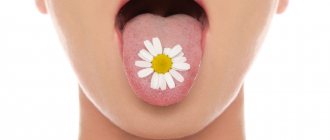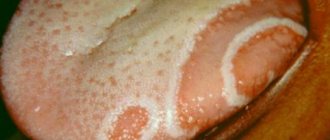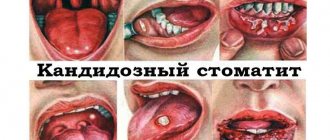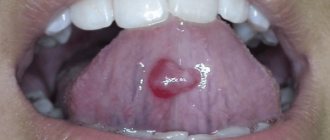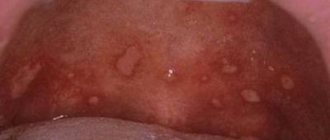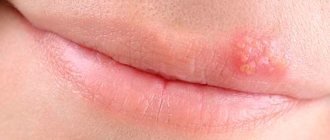Sometimes swelling spreads to the larynx, gums, palate, lips, and taste buds on the tongue. Extensive swelling can cause difficulty breathing, eating, and talking.
Weak and short-lived enlargement of the tongue is most often a manifestation of a common infection or minor injury. But if the swelling does not subside, this may indicate a serious health problem.
Signs of tongue swelling
Here is a list of symptoms that may accompany tongue swelling:
- difficulties chewing, swallowing, talking;
- changing its color;
- difficulty breathing in case of severe swelling;
- swollen lymph nodes under the lower jaw;
- bumps, ulcers, and irritated areas may appear on the tongue;
- pain and burning sensation in the tongue and throat;
- fever, chills and headache;
- bleeding even with slight injuries to the tongue;
- swelling of the lips, throat, gums, and taste buds on the tongue.
Causes
There are many reasons that lead to swelling of the tongue, we will list the most common ones.
Injuries
The most common cause of a swollen tongue is injury (accidental biting, burns, damage from dental instruments, recovery from oral surgery, piercing).
Tongue injuries often occur during attacks of epileptic seizures. The jaw reflexively clenches and bites it. Caregivers can damage the tongue while trying to prevent the epileptic from swallowing it.
Chewing tobacco also irritates the tongue and can cause swelling.
Allergic edema
A common cause of swelling is allergies. The tongue swells after eating allergenic foods or being stung by a bee or wasp. Other allergens are ACE inhibitor drugs used for heart diseases, non-steroidal anti-inflammatory drugs (ibuprofen, aspirin, naproxen).
With allergic urticaria, which can be caused by any allergen, there is a strong feeling of itching and the tongue becomes blistered.
Allergic edema usually develops suddenly. Often not only the tongue swells, but also the lips and gums, swelling appears on the face, and the eyelids swell.
Other symptoms of an allergic reaction are sneezing, runny nose, cough, skin rash, gastrointestinal symptoms (vomiting, stomach upset).
A serious allergic reaction, anaphylactic shock, develops very quickly. Symptoms that require immediate medical attention are swelling of the larynx, shortness of breath, rapid breathing, severe pain, severe swelling at the site of allergen injection.
Diseases
There are a number of diseases that can lead to tongue swelling.
Amyloidosis
Amyloidosis is a disorder of protein metabolism that often develops in older people. With this disease, the tongue gradually enlarges and swelling persists for a long time.
Tongue cancer
The early stage of tongue cancer is characterized by painless ulcers and bumps on this organ, as well as reddened areas or white spots on the surface of the mucous membrane. The tongue gradually increases in size.
Later stages of the disease are accompanied by pain, bleeding from the mouth, numbness in certain areas of the oral cavity, and a constantly sore throat. Problems with eating and speech quickly arise.
Tongue cancer can be successfully treated if the disease is diagnosed early enough. If you notice similar symptoms that last more than two weeks, you should consult a doctor.
Herpes virus
The symptom of herpes is not only a “cold on the lips”. With herpetic lesions of the tongue, swelling is usually accompanied by pain and the appearance of blisters on the surface of the tongue.
The blisters disappear after one to two weeks, but antiviral medications such as acyclovir can speed healing.
Fungal infection
Fungal infections of the oral cavity often occur in children, in adults after treatment with antibiotics, or when immune defenses are weakened.
With oral thrush, the tongue is covered with areas of thick white coating that are difficult to remove. Often the tongue is swollen and painful.
Fungal infections are quickly and easily treated with antifungal drugs, such as fluconazole. If thrush occurs frequently in an adult, you should check your immune status and take an HIV test.
Thyroid deficiency (hypothyroidism)
Hypothyroidism is a metabolic disorder in which the thyroid gland does not produce enough hormones. Symptoms of hypothyroidism include fatigue, depression, dry skin, weight gain, muscle weakness, joint pain, thinning hair.
Sometimes, with thyroid deficiency, swelling of the face is observed. The tongue swells and teeth marks are often visible along the edges.
Scarlet fever
Scarlet fever is a bacterial infection that most often occurs in children between the ages of five and fifteen. Symptoms of the disease are a small red rash, sore throat, nausea, high fever, and enlarged lymph nodes in the neck. On the second to fourth day, the tongue becomes smooth, bright red and swollen. Sometimes the tongue is initially coated with a white or yellow coating, which disappears after a few days, leaving a smooth, crimson-colored surface.
Inflammation of the tongue (glossitis)
When inflamed, the tongue increases in size, the surface becomes smooth and burgundy. There is a pale white coating.
Inflammation develops against the background of allergies, after injury. The development of glossitis can be provoked by infection, burns from hot food, alcohol abuse, insufficient saliva, smoking, and hormonal factors.
Ways to combat glossitis are good oral hygiene and a gentle diet. If the inflammation is infectious, antibiotics are prescribed.
Angioedema
Angioedema is a condition of an allergic nature, but is sometimes inherited. As a rule, the lips, mouth, throat, and tongue are involved in the process. There is no itching, skin color does not change. The size of the swelling increases rapidly. Unlike urticaria, this type of allergic reaction affects a deeper layer of tissue. If swelling affects the mucous membrane of the throat, suffocation and death can occur.
Other diseases that cause swelling of the tongue
Below is a list of other medical conditions that can cause tongue swelling
- Infection due to advanced caries
- Herpangina with ulcers caused by the Coxsackie virus
- Anemia caused by vitamin B12 deficiency
- Multiple myeloma
- Kawasaki syndrome
- Streptococcal infection
- Syphilis
- Problems with the pituitary gland
- Rhabdomyolysis
- Leukemia
- Neurofibromatosis type 1 or oral neurofibroma
- Sarcoma
- Inflammation of the taste buds on the tongue
- Genetic diseases such as Down syndrome or Beckwith-Wiedemann syndrome
Swelling of the tongue due to dehydration
With a lack of fluid in the body (dehydration), a feeling of dryness occurs in the mouth, the tongue increases in size and becomes covered with cracks. Other symptoms of dehydration include dry and cracked lips, loose dry skin, bright yellow urine, burning when urinating.
If such symptoms appear, you should drink enough fluids. Dehydration is a serious condition that can lead to death.
Diseases developing in the body
Their list is quite long1. What diseases cause the tongue to swell:
- gastrointestinal pathologies (colitis, ulcers, gastroenteritis) lead to slight swelling, the appearance of teeth marks around the edges (they are especially noticeable after sleep), the appearance of a whitish-gray plaque, an unpleasant sourish-bitter metallic taste in the mouth,
- Oral candidiasis is an infectious inflammation of the mucous membrane that affects not only the tongue, but also all the internal integuments of the mouth, covered with a cheesy white coating. This is accompanied by itching, burning, pain and, of course, swelling,
- a herpetic infection that can appear first on the lips and then spread to the tongue. It looks red, inflamed, swollen, with many small and painful blisters,
- Scarlet fever is a bacterial infection diagnosed most often in children and adolescents. Accompanied by a sore throat and increased body temperature. The tongue itself seems to swell, becomes smooth, shiny and unusually red,
- amyloid dystrophy, or amyloidosis, is a disorder of the protein metabolism mechanism. Older people are more often affected
- hypothyroidism is a long-term lack of thyroid hormones, which leads to general swelling of the face, including the tongue, and numerous other manifestations,
- glossitis is a specific disease of the tongue - inflammation of the organ. It enlarges, swells, plaque appears on it, has several forms with different symptoms,
- malignant tumor: the organ looks lumpy, unevenly colored, enlarged. As the disease progresses and moves from stage to stage, bleeding, pain, local compaction, and numbness of areas appear.
The photo shows candidiasis of the tongue
There are other diseases that cause swelling of the tongue. Edema becomes a consequence of inflammatory processes in the body, including dental pathologies. Among the diseases of the oral cavity that can affect the tongue is stomatitis.
Causes based on the location of the swelling
Swelling under the tongue (“ball under the tongue”)
Inflammation of the salivary gland under the tongue
If swelling occurs under the tongue, this indicates a problem with the salivary glands. There are many reasons for this condition - infection, stones in the salivary glands, mumps, HIV, influenza, parainfluenza type 1 or 2, herpes, tumor, poor oral hygiene.
Swelling on one side of the tongue
Swelling of the tongue on one side
Unilateral swelling of the tongue does not indicate a specific disease; it can also be caused by a number of diseases - bacterial infection, herpes virus, tumor.
Sometimes one side of the tongue swells after an injury - a burn, a bite, or after surgery. An allergic reaction and angioedema often affects a specific area of the tongue - the tip, left or right side.
Swelling with teeth marks around the edges
Swelling of the tongue with teeth marks
Sometimes the swollen tongue shows marks from the teeth along the edges. This tongue occurs when there is a lack of nutrients in the body, problems with the thyroid gland, water retention in the body (due to diabetes, enlargement or inflammation of the liver). Sometimes the condition can be caused by problems with the spleen, which is often accompanied by bloating and excess weight. If the problem is the spleen, then eating foods that are healthy for it (vegetables, herbs) can help.
What measures to take if a tongue tumor occurs
Which doctor to contact if you notice the listed symptoms depends on the identified signs of a particular disease. Among the specialists involved in the treatment of tongue tumors, as an independent disease or as a concomitant manifestation, are allergists, dentists, immunologists, oncologists, infectious disease specialists and traumatologists.
“After pregnancy, I began to notice that my tongue was swollen, and then teeth marks became visible on it. More on the right side than on the left. And when I look in the mirror, I can see that the papillae are somehow inflamed and slightly elongated.
At first I thought that I had some kind of allergy to food, but when my therapist sent me to get tested for thyroid hormones, then we saw what was the matter. TSH increased significantly, T4 also went down. The doctor says that my long-term hypothyroidism after pregnancy manifests itself this way, the hormonal levels have changed.
But I never thought that language would also “participate” in this.
A blood test may be required to make an accurate diagnosis.
What should you do if your tongue is swollen first? First you need to consult a doctor and determine the cause of the pathology and only then begin treatment.
Depending on the type of disease, treatment and composition of medications are selected.
It is possible to make a diagnosis based on diagnostics using a biopsy, testing for tumor markers, obtaining blood tests, bacterial cultures, as well as functional diagnostics (ultrasound, CT, X-ray) of organs.
To make an accurate diagnosis, you may need the help of several specialists, since the diseases can be related to each other, and the common symptom is swelling of the tongue.
Treatment
Treatment for tongue swelling depends on the cause of the condition.
Treatment of allergic edema
In case of allergic edema, first of all, you need to determine the allergen substance and eliminate contact with the allergen. Antihistamines and corticosteroids are used to treat allergies. In case of severe swelling, methylprednisolone, Benadryl, and adrenaline injections are used.
Treatment of infectious edema
To treat infectious swelling, you should consult a doctor. Bacterial infections are treated with antibiotics; for viral diseases, drugs are prescribed that reduce the symptoms of a viral infection.
Traumatic edema
Serious tongue injuries require medical intervention to stop the bleeding and reduce swelling. For minor injuries, you can apply a piece of ice to the tongue and use painkillers.
Treatment with home remedies
When treating edema, various home remedies that happen to be at hand can be used.
- To care for your tongue, use a soft toothbrush. Use a brush to gently clean your tongue periodically.
- A lump of sugar on the tongue can reduce swelling.
- A diluted turmeric solution (water and turmeric powder) reduces inflammation. Rinsing your mouth with a sea salt solution helps with both viral and bacterial infections.
- Another recipe is to use a mixture of mint, anise and rosemary for rinsing.
- Salt intake should be reduced as salty foods stimulate saliva production, which can cause problems if the tongue is swollen.
- Add chopped celery to your food.
- Drink small amounts of water regularly.
- Swelling can be reduced by placing a chilled spoon or ice cube on the tongue.
How to cure a swollen tongue
What to do if you see a swollen tongue? Healing edema must be focused on eliminating the root cause.
For infectious diseases, bactericidal and antiviral therapy is carried out. So, for herpes, the product Acyclovir is prescribed, for fungal infections - Flucostat Capsules, Fluconazole, Clotrimazole.
Syphilis is treated with antibiotics from the penicillin and tetracycline groups. Scarlet fever is also cured with penicillins, and antihistamines are immediately prescribed. Antihistamines are also used in cases where swelling is caused by allergic reactions.
Hypothyroidism and acromegaly require hormone replacement therapy. First, you need to donate blood to determine which hormones are missing and which are in excess. And in accordance with the results of the tests, the drug is selected.
If cancerous tumors of the tongue occur, they are usually removed surgically, and then chemotherapy and radiotherapy are performed.
In cases where the tongue is swollen for everyday reasons, the swelling subsides on its own after a few days.
In this case, drug treatment is not necessary. It is only necessary to limit the consumption of very hot or very cool foods, as well as spicy foods.
To speed up the healing of the tongue, you can use traditional methods.
For these purposes, you can prepare anti-inflammatory rinse solutions. Chamomile in filter bags, sage or calendula will come in handy. These herbs need to be diluted with a little warm water and rinsed the mouth several times a day until the unpleasant symptoms are completely eliminated.
Raw potato juice is also suitable for rinsing; it has a calming effect. Several potatoes need to be crushed in a blender or grated, squeeze out the resulting pulp through gauze or a bandage, then rinse the mouth with the purchased juice.
You can apply ice wrapped in a layer of cloth to your tongue. This is done in order to avoid additional problems in the form of frostbite.
Baking soda has a good disinfectant effect.
This product is excellent because everyone has it at home and does not require any additional manipulations, apart from diluting it in water. In addition, soda will not sting if there are microtraumas, for example, from an insect bite or piercing.
For rinsing, you can use furatsilin pills. You will need 2 pieces per glass of water. For best dissolution of the pill, it is recommended to crush it first.
Now you understand everything about the causes and treatment of tongue swelling. Take care of your own food health indicator!
We suggest you read: Is it possible to remove a crown without damaging it - Dentist's Diary




